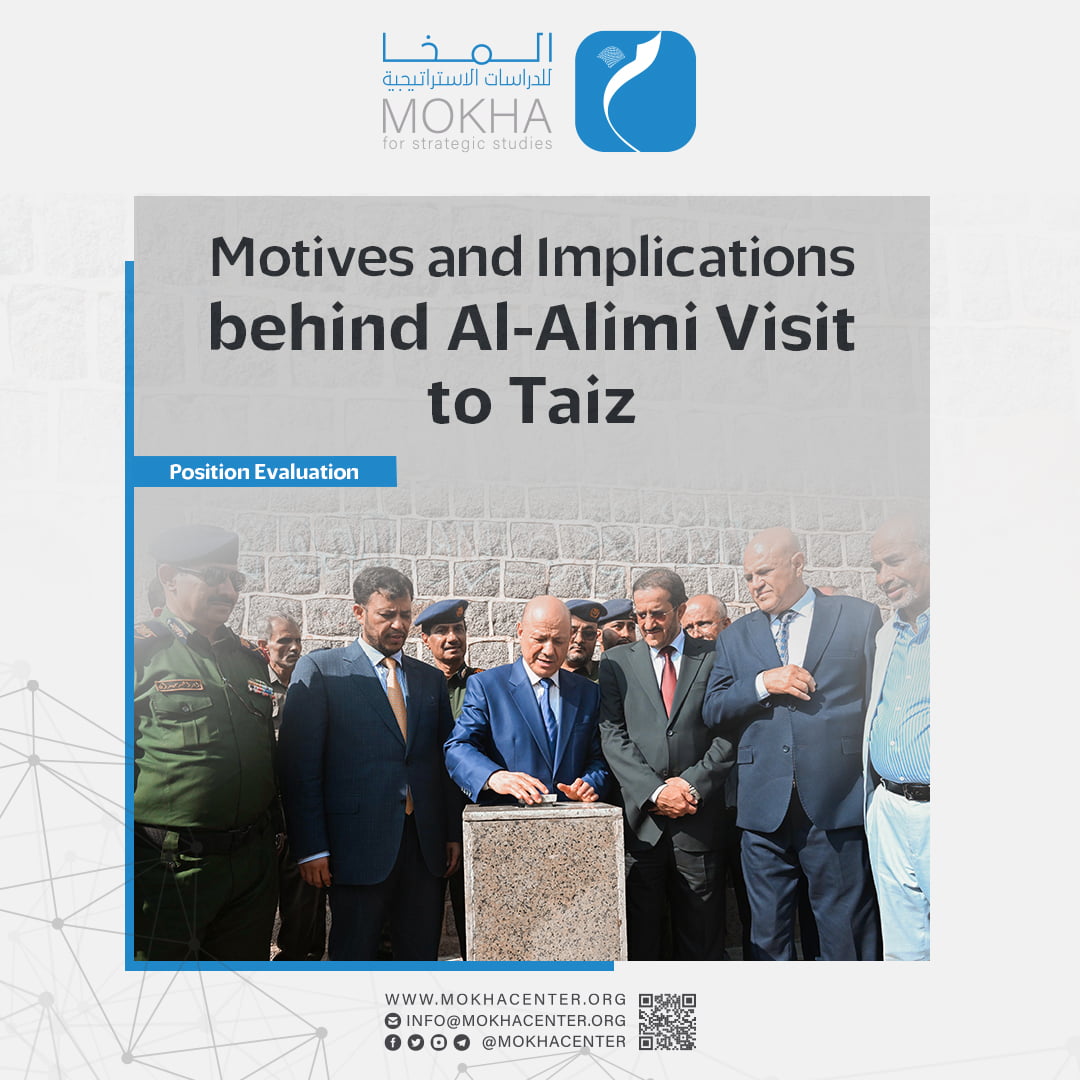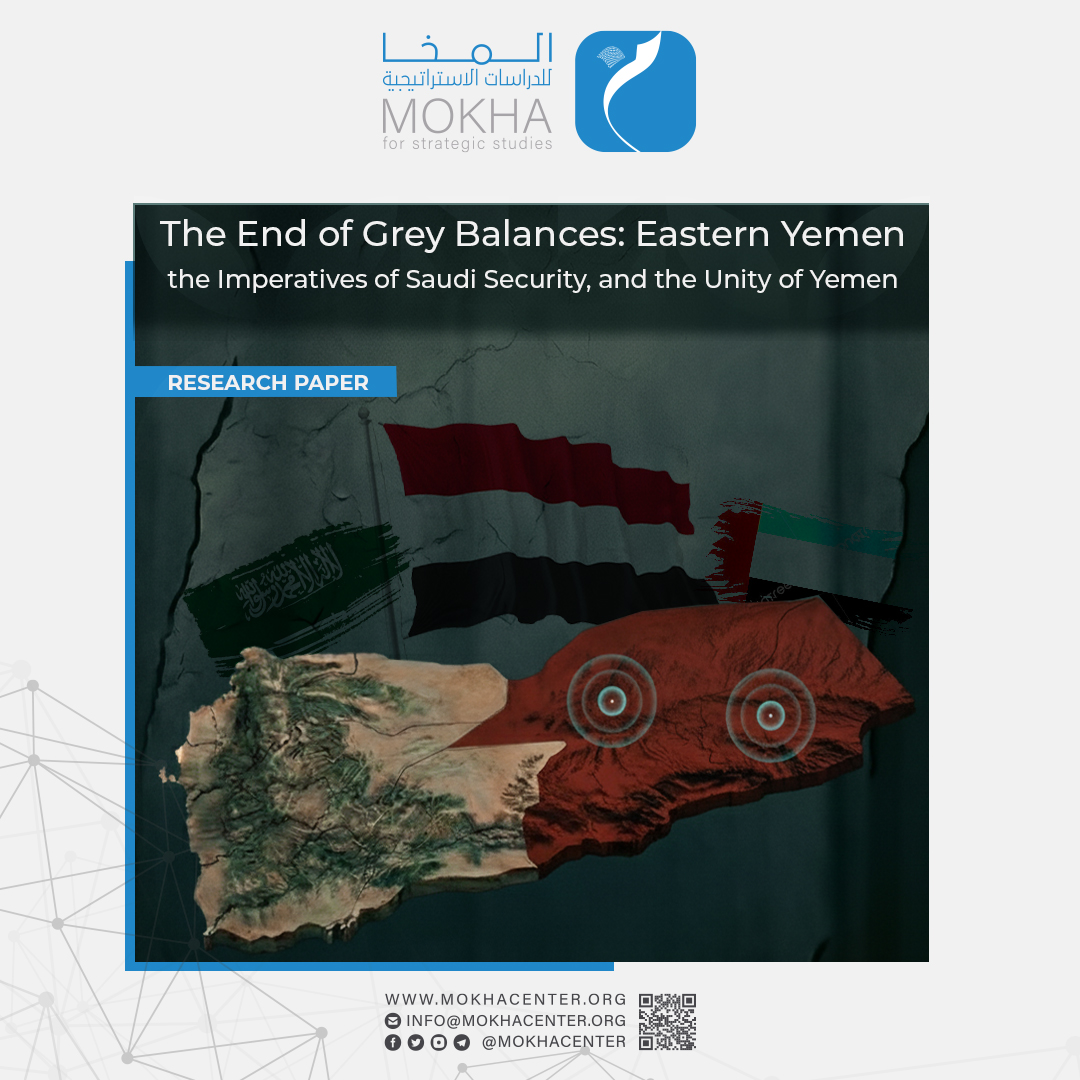Motives and Implications behind Al-Alimi Visit to Taiz

Abstract
On Tuesday, August 27, 2024, Rashad Al-Alimi, chairman of the Presidential Leadership Council, along with council members Abdullah Al-Alimi and Othman Mujalli, as well as several government officials, made a historic visit to Taiz Governorate. This marked the first presidential visit to the governorate in over 15 years. The visit aimed to address some specific needs of Taiz Governorate and achieve objectives for the region and the chairman of the council, too.
This paper explores the developments in Taiz Governorate, the motivations behind the chairman’s visit, the Saudi role in facilitating and supporting the visit, and the potential outcomes and opportunities arising from it.
Taiz Governorate
Located approximately 256 kilometers (159 miles) south of the capital, Sana’a, Taiz Governorate is the most populated in the Republic, with its residents making up about 12.2% of the total population. The governorate comprises 23 districts, with the city of Taiz, situated by Mount Saber, serving as its center. Despite its challenges, agriculture remains a key economic activity in the governorate, along with livestock raising and fishing in the coastal city of Mocha. Additionally, Taiz is home to various industrial facilities, including the Al-Bahr Cement Factory and several factories operated by the Hayel Saeed Anam & Co. Group.
A Lever for Change and a Starting Point for Popular Resistance
Historically, Taiz has been known as the geographical and cultural counterpart to the rule of the “Hadi” imams in northern Yemen. In contemporary history, it has stood out for its cultural significance, high levels of education and the presence of various intellectual and political movements. In 2011, Taiz played a pivotal role in the popular protests to former President Ali Abdullah Saleh’s rule, which led to military and security retaliation against the city.
Taiz also emerged as a critical hub of “popular resistance” against the Houthi group’s coup and their armed takeover of the capital, Sana’a, on September 21, 2014. As the Houthis advanced to other governorates, including Taiz, Ma’rib and Aden, the people of Taiz were compelled to arm themselves to defend both the state and their homeland, preserving the political achievements made since the September 26, 1962, revolution.
On April 30, 2015, under the leadership of Sheikh Hamoud Al-Mikhlafi, Taiz’s “Popular Resistance” was established. It became the primary defense line, preventing the Houthis from advancing to Bab al-Mandab Strait and the city of Aden despite limited resources. Since then, Taiz has remained a central stronghold for the Popular Resistance and the National Army and continues to be a significant base of popular support for their efforts.
War, Siege and Suffering
The Houthis initiated the war in Taiz Governorate and across Yemen, with the conflict intensifying following the military intervention of the Arab Coalition, led by Saudi Arabia, on March 26, 2015. The war has persisted in Taiz city since then, leaving profound scars and repercussions on both the governorate and the city. Due to the conflict and the policies of the Arab Coalition, Taiz has become a militarized zone, contested by three main parties:
- The Popular Resistance and the National Army,
- The Houthis,
- The so-called Republican Guard Forces.
The legitimate government forces and the Popular Resistance have secured approximately 60% of the governorate, including all the strategic districts around Jabal Sabr. Meanwhile, the Houthi group, backed by Iran, controls the districts of At-Ta’iziyah, Haifan, Dimnat Khadir, Sha’rab Ar-Rawnah, Shar’ab As-Salam, Mawiyah and Maqbanah. On the other hand, the Guards of the Republic, under the command of Brigadier General Tareq Muhammad Abdullah Saleh, former President Ali Abdullah Saleh’s nephew, hold the districts of Al-Mokha, Mawza, Al-Wazi’iyah and Dhubab along the Red Sea coast. These forces receive direct support from the United Arab Emirates.
The city of Taiz itself is similarly divided among these factions. Government forces and the Popular Resistance control most of the city, while the “Abu Al-Abbas Brigades,” led by Adel Abdu Farea — a Salafi military formation supported by the UAE — were concentrated in Old Taiz. These brigades were intended to function similarly to the Emirati-backed security belts in several southern governorates but were withdrawn to the Al-Kadha area in April 2019 after bloody clashes with National Army-led security campaigns aiming to restore order in the city. Meanwhile, the Houthis maintain control over the Al-Hawban area, located on the eastern outskirts of Taiz, which houses the factories of the Hayel Saeed Anam Co. Group, which provides 70% of the governorate’s total revenues.
Since March 2015, the city of Taiz has endured the Houthi group’s devastating nine-year siege. This blockade has led to the destruction of large parts of the city, particularly in areas along the frontlines, where many residents, including women and children, have been exposed to sniping and killing. The closure of main roads leading to Taiz has severely restricted the movement of people, goods and commodities, forcing residents to rely on difficult and lengthy alternative routes. As a result of the siege, the cost of living in Taiz has soared, with prices for food and fuel rising significantly higher than in other areas. Transporting essential goods from Aden to Taiz now takes anywhere from 14 hours to several days, further inflating transportation costs due to the additional fees at various checkpoints.
The suffering of Taiz’s residents has been exacerbated by the oppressive policies of the political party that has controlled Aden and the southern governorates since 2019. The city has also been plagued by government neglect and a lack of attention from the international community. Despite the “Stockholm Agreement” “in place” between the legitimate government and the Houthi group, which included provisions to lift the siege on Taiz, this has not been implemented in practice. The city has endured years of internal conflict between the Abu al-Abbas Brigades and the National Army forces. Moreover, the people of Taiz — as the rest of the Yemeni population — are suffering from worsening living and humanitarian conditions due to the severe decline in the national currency’s value in areas under the legitimate government’s control, as well as the non-payment of salaries in Houthi-controlled districts.
Motives for the Visit
With this, his August 27, 2024, visit to the city of Taiz, Rashad Al-Alimi, chairman of the Presidential Leadership Council, marks his first visit since the PLC’s formation on April 7, 2022, and it is the first visit by a top state official in nearly 15 years, since 2006. Although this visit was delayed significantly due to security concerns, its timing seems to have been driven by several key factors:
- Demonstrating the Recovery of Legitimate Authority
The visit follows previous trips by Al-Alimi to the governorates of Hadhramaut, Al-Mahrah and Ma’rib, signaling a partial recovery of legitimate authority. Taiz Governorate appeared to be a priority for Al-Alimi, but the security situation and associated risks had delayed his visiting. The proximity of Houthi forces and the ongoing security challenges in Taiz, which intensified after the reopening of the road between the city and the adjacent Al-Hawban area posed significant obstacles. The visit aimed to showcase the recovery of the country’s legitimate authority and to strengthen the relationship between local authorities in the governorates, the legitimate government and the Presidential Leadership Council.
- Strengthening Al-Alimi’s Position within the Presidential Leadership Council
Another likely motive for the visit was to reinforce Chairman Al-Alimi’s standing within the council, especially given the challenges facing it. His previous visit to Mukalla had been met with opposition from Hadhrami factions, who expressed dissatisfaction with the governorate’s administration and presented specific and general demands.
Additionally, Al-Alimi faces challenges in Aden due to the Southern Transitional Council’s dominance, which exerts control over the city through its military formations, and ongoing tensions between Al-Alimi and council members affiliated with the STC, supported by the UAE. The visit to Taiz was likely intended to demonstrate the broad popular support that Al-Alimi enjoys, thereby strengthening his position within the PLC.
- Acknowledging the Struggles of the People of Taiz
The visit was seen by many as an effort to restore Taiz’s reputation after years of neglect and to honor its significant national contributions. Al-Alimi expressed his pleasure in visiting Taiz, referring to it as the greatest stronghold of resilience against the Imamate Project. He emphasized that Taiz “will remain a pillar of the national cause, a cradle of change, and a capital of steadfastness,” forged through years of an unjust siege imposed by what he described as the Houthi militia. He also commended the humanitarian and development initiatives of the Coalition to support legitimacy, led by Saudi Arabia and the UAE, highlighting the importance of these projects in bolstering the governorate’s resilience and supporting efforts to liberate it.
The visit also provided an opportunity for the PLC to directly assess the situation in the governorate. Al-Alimi, accompanied by council members Abdullah Al-Alimi and Othman Majli, held meetings with local authority leaders, the executive office, military and security officials, civil society organizations, as well as political, social, women’s, youth and media representatives. They were briefed on the latest national developments and the priorities for the coming stage. Al-Alimi also met with the security committee in Taiz Governorate, in the presence of the President’s advisor for Defense and Security Affairs, Lieutenant General Mahmoud Al-Subaihi; the Minister of Interior, Major General Ibrahim Haydan; and Taiz Governor Nabil Shamsan, who chairs the committee.
The President and his delegation also inspected several combat fronts in the governorate, where they received briefings from the commanders on the operational situation across various fronts. Al-Alimi praised the high morale of the armed forces and popular resistance fighters in the governorate and commended their level of combat readiness.
Saudi Role
Saudi Arabia played a significant role during the visit by providing both security and economic support, ensuring its success. Saudi funding facilitated the establishment of several development projects, including the foundation of the Specialized Oncology Center, the Asifrah Power Station (with a 30-megawatt capacity), the Al Mawasit Rural Hospital in Al Mawasit District, the rehabilitation and equipping of the Industrial Technical Institute in Taiz City, as well as the construction of Al-Wahda Model School in the District of Jabal Habashi, all under the Saudi Reconstruction Program and with Al-Alimi’s involvement.
Saudi Arabia also provided security protection for Al-Alimi, who traveled from Aden to Taiz City in Saudi military armored vehicles, escorted by security personnel. It also appears that Saudi Arabia reached an agreement with the Houthi group to prevent any interference with the visit. Despite the proximity of Houthi-controlled areas to the locations visited by Al-Alimi, the Houthis refrained from any actions that might disrupt the visit, likely due to this Saudi understanding.
Taiz Residents Long for the Return of the State
The visit highlighted that, despite the harsh conditions endured by the people of Taiz Governorate — due to the war, prolonged siege and government neglect — they still gathered to welcome the Presidential Leadership Council’s chairman. This reflects the deep yearning that the people of Taiz, like the rest of Yemen, have for the return of the state. Their commitment to constitutional legitimacy and popular resistance remains strong as they continue the crucial struggle to end the Houthi coup and restore state institutions, with the goal of building a modern civil state founded on justice and equality for all citizens.
Expected Outcomes of the Visit
Presidential Leadership Council Chairman Al-Alimi’s visit to Taiz demonstrated that he has substantial popular support and the ability to maneuver despite risks and restrictions, bolstered by Saudi’s backing. For the people of Taiz, who have long suffered from war and neglect, the visit was a significant morale booster. Al-Alimi, a native of Taiz and its former security chief, brought promises of development projects under the Saudi Development and Reconstruction Program for Yemen (SDRPY) and pledged support for the liberation of the governorate, with the goal of using it as a base to free other regions still under Houthi control.
However, the visit’s tangible outcomes were modest. This is largely due to the limited financial resources of the legitimate government, which has been hindered by restrictions on oil exports, the reduced funds available to the local authority in Taiz and the declining support from the Arab Coalition countries. The expected results of the visit are likely to be modest, as seen in the example of Al-Alimi’s visit to Hadhramaut Governorate in June 2023, after which many promised projects were not implemented, leading to a disappointing follow-up visit in July.
Recommendations for policymakers
- As the chairman of the Presidential Leadership Council, Rashad Al-Alimi should ensure close follow-up on the progress of the projects initiated in the governorate, making sure they are completed within the planned timeframe. Delays could lead to frustration, potentially damaging the crucial support base for the legitimate government, the Presidential Leadership Council and even himself.
- It might have been wiser for the chairman to leave the decision on changing the leadership of the local authority in Taiz Governorate open for consideration, with the flexibility to implement it at any time. Announcing a six-month timeframe suggested that leadership changes wouldn’t happen soon, despite significant performance issues.
- The chairman must prioritize and fulfill his promises to find comprehensive solutions for war-wounded individuals and the families of martyrs, ensuring these commitments receive immediate and sustained attention.

